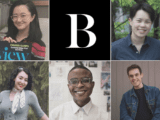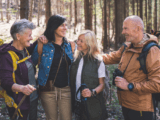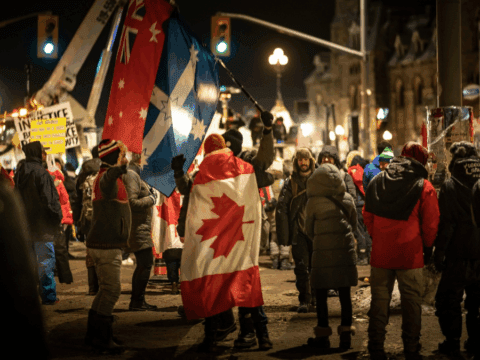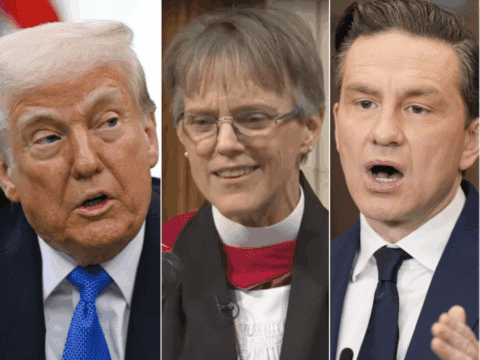Most of us are familiar with wedding expos and baby expos, gigantic showcases that bring together purveyors of top-of-the-line goods and services with clienteles who are facing significant transitions — an impending marriage or birth. They generally take place in arenas or convention centres and attract huge crowds.
This event was billed as a “legacy expo,” the phrase being, I realized quickly, a euphemism for end of life or, more bluntly, death. It was held not in an arena but in a Quaker meeting house in midtown Toronto, a modest space with room for 15 merchants at a circle of tables. Morbid though it seemed, I decided to give it a look.
You may unsubscribe from any of our newsletters at any time.
I confess that I don’t generally think much about dying, though many in my generation do. Baby boomers, that great bulge in the population whose concerns for so long have dominated the culture, have moved from preoccupations with creative retirement or the adequacies of the health-care system to a fascination with death. Witness the immense popularity last year of the Royal Ontario Museum’s multisensory exhibit Death: Life’s Greatest Mystery or the growth of death cafés, where people dish the dirt on dying over tea and cake. Or the non-funereal celebrations of life that eschew ritual in favour of personal storytelling. For my contemporaries, death has become the next item on the to-do list. What it will look like. How to prepare for it. How to make it your own. Bespoke death, if you will.
Michael Brooke, the legacy expo founder, greeted me with an enthusiastic handshake. At 60, Brooke, who runs a business publishing people’s memoirs, does think a lot about the topic. He billed this event as “offering a new perspective on preparing for life’s final chapters.” While he allowed this was a first dipping of toe into legacy expo water, he fully expected the concept to take off. In fact, the Toronto event would be the first of several, including one in Ottawa this May. His promo declared, “We aim to transform the discourse on death and legacy planning, moving from a realm of taboo and apprehension to one of open and normalized conversation.”
Everything came off as a bit less profound than that. The prevailing mood was a mix of earnest mission and naked salesmanship. Pumped up vendors came armed with services and products, everything from helping folks write their life stories to planning finances and estates. Effy Terry and Sage Goldenberg appeared amply able to assist in decluttering your home and moving you into smaller digs or, as Terry described it, providing “estate and death clearing.” Then, by literally circling the room, you could move on to Hospice Toronto, Cardinal Funeral Homes or Eirene Cremations, which offers an online urn store and memorial jewelry.
A young woman, Kate Nikalaidis, stood ready to organize your lifetime of photos. A photographer herself, she confessed, a bit ruefully I thought, that she now spends time with other people’s pictures. But she can help reduce to a mere shoebox the recycling bins’ worth of photographs that many people have. “Throw out everything but pics with people, and minimize the duplicates,” she advised cheerfully.
Other presenters offered services to help people grieve or confront the esoteric mystery of death through videos with such titles as Death and Dreaming: Does Consciousness Continue After Death? and Architecture of Death: The Inner World of Dying. (This presentation, part of the When You Die Project, indulged in a bit more speculation than fit my comfort zone. Having grown up surrounded by Christian beliefs, I’m not quite ready to theorize about our levels of consciousness after death, but the movement has its following.) A couple of poets were there, too, along with practitioners of yoga and meditation, promoting the solace, be it for death anxiety or grief, to be found in their services.
A large vertical banner invited in passersby from the street, but traffic seemed more a trickle than a deluge. Most were middle-aged and up, arriving in couples and alone, from a range of cultural backgrounds and rarely numbering more than two or three at a time. A couple in their late 70s, who asked not to be named, told me they were “curious, because it’s getting to be that time.” Some who came by were already in the business. Christina and Pearl (visitors who likewise declined to give their surnames) explained that they were training to be death doulas, hoping, as Christina put it, “to serve our community.”
Overall, the offerings fit into a handful of themes. One is the need to confront avoidance. Society and the media may recognize that the silver tsunami of boomers is on its way to overwhelming first the health system and then the death system. Individually, however, many of us tend to put things off. We’re not ready. I’m not ready. It’s not that death is a taboo topic, exactly, but our failure to grapple with important decisions and preparations seems something that’s begging for a remedy.
I confess that I don’t generally think much about dying, though many in my generation do. Baby boomers, that great bulge in the population whose concerns for so long have dominated the culture, have moved from preoccupations with creative retirement or the adequacies of the health-care system to a fascination with death.
How many people of a certain age have not yet made a will? If you’re a Canadian boomer who expects to leave an inheritance, the answer is: not quite half. How many have not booked their decluttering or articulated their funeral or burial wishes? Or how they want to handle the last weeks, months or even years leading up to the end?
This, for Carly Hickey, is a gap demanding to be filled. A registered nurse who worked in an intensive care unit for 12 years, Hickey has set up an end-of-life consulting company, Advance Care and Emergency Planning (ACE Planning), through which she is available to help make plans about any number of things.
Hers is a fertile field; she told me that when families arrive at the funeral home there are still a huge number of decisions to be made. Does she advise on medical assistance in dying? She said if someone brought that up she would ask them to speak to their primary care provider.
Another theme was the relationships and even the tensions between generations. I didn’t see anyone visiting the legacy expo with their parents or their children. Yet the primary reason Terry, the decluttering expert, will help you clear out your house is to spare your kids. Financial planner Andy Kovacs will enthusiastically help both you and your children make sure you don’t pay more tax than you need to. Expo organizer Brooke and another memoir publisher, Rafi Moshe, will help you put your life story down on paper so it will be there for the grandkids.
A third theme had to do with changing attitudes within our society. Cindy Ciampa, a pre-planner with Cardinal Funeral Homes, says the funeral industry is grappling with everything from increasing secularism to environmental consciousness. Fewer and fewer of us live in tight, like-minded communities where ways of doing things can be taken for granted. Funeral homes “can no longer assume the standard mahogany casket with a day of visitation in the chapel and a religious service and burial,” she said.
More on Broadview:
Social fragmentation also means many of us don’t have the same support systems we did in the past, so novel efforts have to fill the gap. At another table sat Lori Baine. A longtime member of the pastoral care group in her East End United congregation, Baine is familiar with how a local faith community supports its members through grief and bereavement. In her work as a nurse at a Toronto hospital and active member of the Ontario Bereavement Network, however, she arranges grief counselling for mourners. The service requires jumps across secular and multifaith communities, often using technology to replace face-to-face encounters.
Other use of technologies is also becoming more pervasive. Legacy expo vendor Sarah Khatau, for example, works for Help Texts, a service that sends text messages by phone to clients seeking regular grief support. Men and seniors report finding the texts especially helpful.
Technology will be an intriguing — or perhaps alarming — feature of all kinds of death-related experiences in the future. Nobody at the legacy expo was demonstrating robots for personal care or companionship as we might see in Japan, but artificial intelligence was on offer in other ways. Should you engage with Moshe to produce a printed book of your life stories, you’ll first be interviewed, not by a human being but by a chatbot.
***
Personally, I’m not quite ready to sign up for many of the services offered at the legacy expo, but should these events prosper, it will be due to the boomers’ vaunted success at mak- ing everything about us, placing our concerns at the centre of the culture and controlling what that looks like. Boomers are approaching death the way we’ve approached life — rejecting tradition and celebrating individuality — and the legacy expo is tapping into our need to do death our own way.
We’ve been able to dominate the agenda for almost our entire lives. Why stop now at the last item on the bucket list?
***
Larry Krotz is a writer and filmmaker in Toronto. His latest book is Trapped by Tourism: Sustainability Questions for a World Fueled by Travelers.
This article first appeared in Broadview’s March 2025 issue with the title “Bespoken Death.”














Recently I presided at the service of a funeral director I had worked with for the last 25 years. He taught me a lot. The biggest lesson was to change the questions we ask families. Instead of “This is what we do…” and conduct a traditional Christian funeral service, ask, “What did this person mean to you and how can I assist in celebrating that?”
This has led to services which are both meaningful to everyone, including myself, but were not a traditional, solemn service. Most were at the graveside, in the local Legion Hall or some other community place. Some were even in the church.
One service was for a local fiddle teacher, whose students included Canadian champion musicians and well-known artists. A tribute to their teacher turned into a full blown fiddle concert and jam session. Another service for a young man who died on the streets was held in the local community soup kitchen.
Was the Gospel preached? Yes. Was the resurrection proclaimed? Yes. Was the one who had died remembered and honoured? More than you could imagine.
We walk with people in their grief. The way we walk with them and how we help the living honour their loved one is what matters.